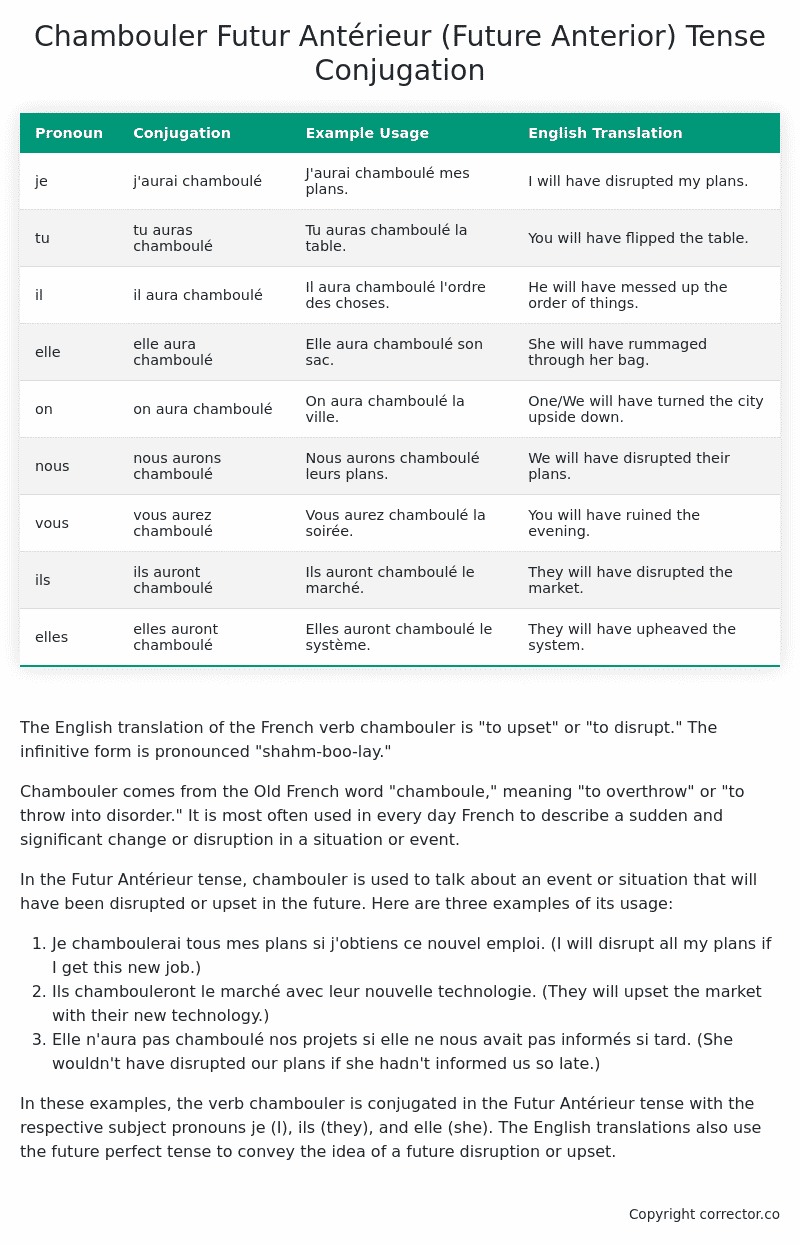Futur Antérieur (Future Anterior) Tense Conjugation of the French Verb chambouler
Introduction to the verb chambouler
The English translation of the French verb chambouler is “to upset” or “to disrupt.” The infinitive form is pronounced “shahm-boo-lay.”
Chambouler comes from the Old French word “chamboule,” meaning “to overthrow” or “to throw into disorder.” It is most often used in every day French to describe a sudden and significant change or disruption in a situation or event.
In the Futur Antérieur tense, chambouler is used to talk about an event or situation that will have been disrupted or upset in the future. Here are three examples of its usage:
- Je chamboulerai tous mes plans si j’obtiens ce nouvel emploi. (I will disrupt all my plans if I get this new job.)
- Ils chambouleront le marché avec leur nouvelle technologie. (They will upset the market with their new technology.)
- Elle n’aura pas chamboulé nos projets si elle ne nous avait pas informés si tard. (She wouldn’t have disrupted our plans if she hadn’t informed us so late.)
In these examples, the verb chambouler is conjugated in the Futur Antérieur tense with the respective subject pronouns je (I), ils (they), and elle (she). The English translations also use the future perfect tense to convey the idea of a future disruption or upset.
Table of the Futur Antérieur (Future Anterior) Tense Conjugation of chambouler
| Pronoun | Conjugation | Example Usage | English Translation |
|---|---|---|---|
| je | j’aurai chamboulé | J’aurai chamboulé mes plans. | I will have disrupted my plans. |
| tu | tu auras chamboulé | Tu auras chamboulé la table. | You will have flipped the table. |
| il | il aura chamboulé | Il aura chamboulé l’ordre des choses. | He will have messed up the order of things. |
| elle | elle aura chamboulé | Elle aura chamboulé son sac. | She will have rummaged through her bag. |
| on | on aura chamboulé | On aura chamboulé la ville. | One/We will have turned the city upside down. |
| nous | nous aurons chamboulé | Nous aurons chamboulé leurs plans. | We will have disrupted their plans. |
| vous | vous aurez chamboulé | Vous aurez chamboulé la soirée. | You will have ruined the evening. |
| ils | ils auront chamboulé | Ils auront chamboulé le marché. | They will have disrupted the market. |
| elles | elles auront chamboulé | Elles auront chamboulé le système. | They will have upheaved the system. |
Other Conjugations for Chambouler.
Le Present (Present Tense) Conjugation of the French Verb chambouler
Imparfait (Imperfect) Tense Conjugation of the French Verb chambouler
Passé Simple (Simple Past) Tense Conjugation of the French Verb chambouler
Passé Composé (Present Perfect) Tense Conjugation of the French Verb chambouler
Futur Simple (Simple Future) Tense Conjugation of the French Verb chambouler
Futur Proche (Near Future) Tense Conjugation of the French Verb chambouler
Plus-que-parfait (Pluperfect) Tense Conjugation of the French Verb chambouler
Passé Antérieur (Past Anterior) Tense Conjugation of the French Verb chambouler
Futur Antérieur (Future Anterior) Tense Conjugation of the French Verb chambouler (this article)
Subjonctif Présent (Subjunctive Present) Tense Conjugation of the French Verb chambouler
Subjonctif Passé (Subjunctive Past) Tense Conjugation of the French Verb chambouler
Subjonctif Imparfait (Subjunctive Imperfect) Tense Conjugation of the French Verb chambouler
Subjonctif Plus-que-parfait (Subjunctive Pluperfect) Tense Conjugation of the French Verb chambouler
Conditionnel Présent (Conditional Present) Tense Conjugation of the French Verb chambouler
Conditionnel Passé (Conditional Past) Tense Conjugation of the French Verb chambouler
L’impératif Présent (Imperative Present) Tense Conjugation of the French Verb chambouler
L’infinitif Présent (Infinitive Present) Tense Conjugation of the French Verb chambouler
Struggling with French verbs or the language in general? Why not use our free French Grammar Checker – no registration required!
Get a FREE Download Study Sheet of this Conjugation 🔥
Simply right click the image below, click “save image” and get your free reference for the chambouler Futur Antérieur tense conjugation!

Chambouler – About the French Futur Antérieur (Future Anterior) Tense
Construction
Common Everyday Usage Patterns
Interactions with Other Tenses
For example
Summary
I hope you enjoyed this article on the verb chambouler. Still in a learning mood? Check out another TOTALLY random French verb conjugation!


